北师大版(2019)必修第二册Unit 4Information technology Lesson 1 Reading Grammar课件-(33张ppt)
文档属性
| 名称 | 北师大版(2019)必修第二册Unit 4Information technology Lesson 1 Reading Grammar课件-(33张ppt) | 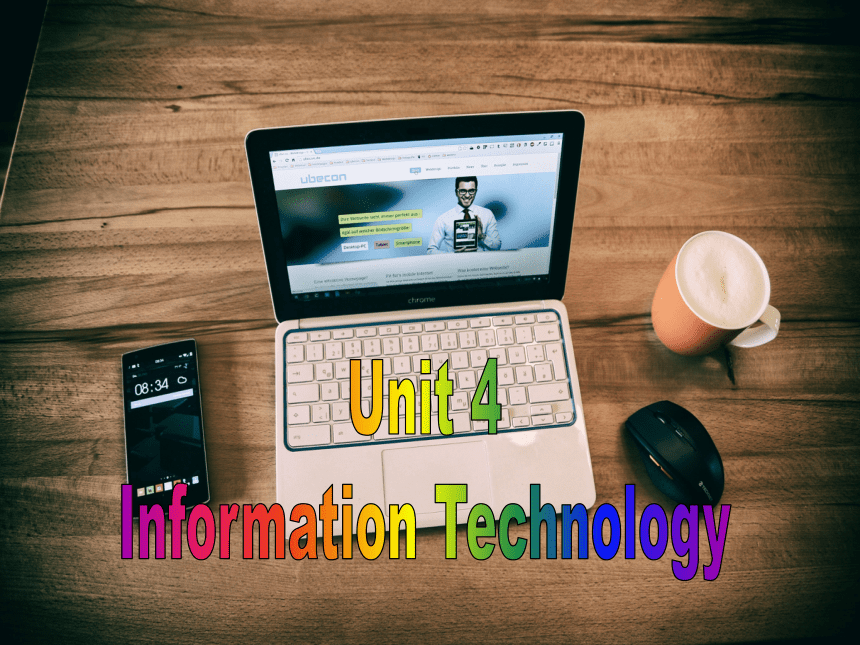 | |
| 格式 | zip | ||
| 文件大小 | 5.4MB | ||
| 资源类型 | 教案 | ||
| 版本资源 | 北师大版(2019) | ||
| 科目 | 英语 | ||
| 更新时间 | 2022-10-09 09:52:41 | ||
图片预览

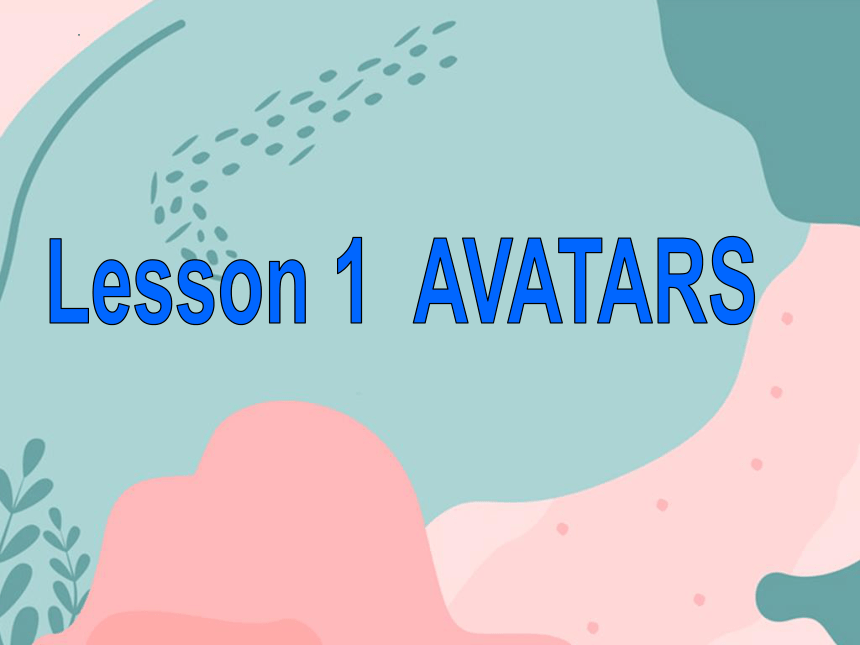



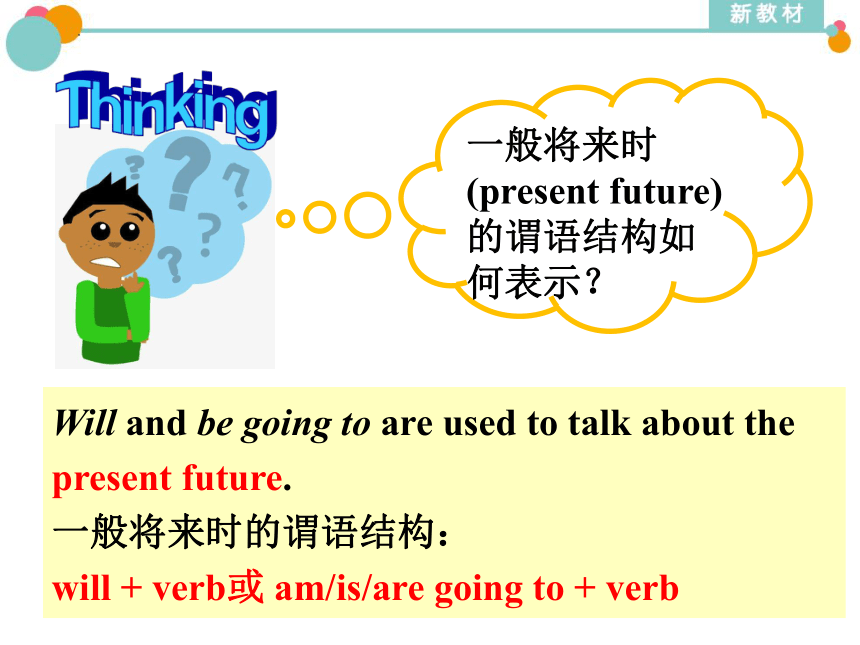


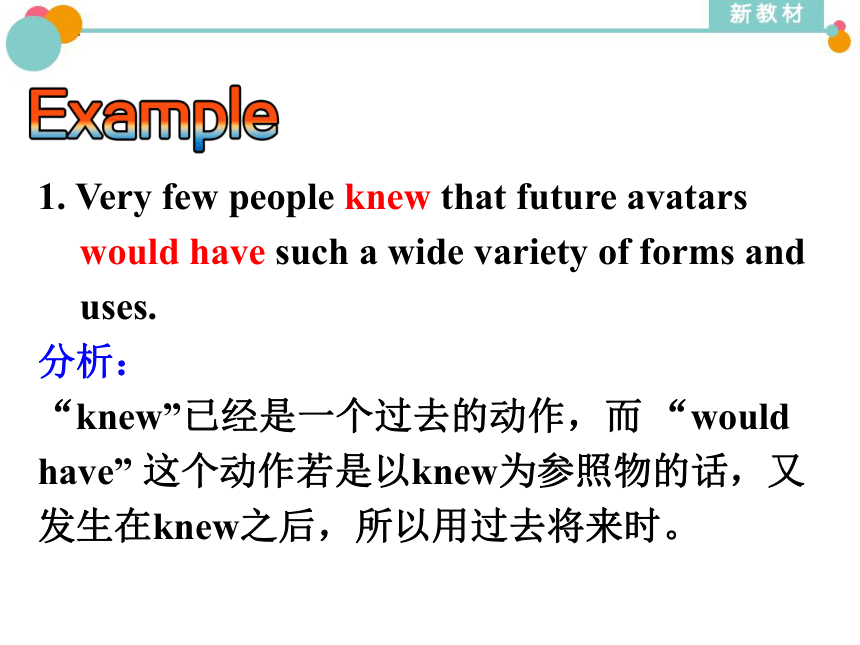
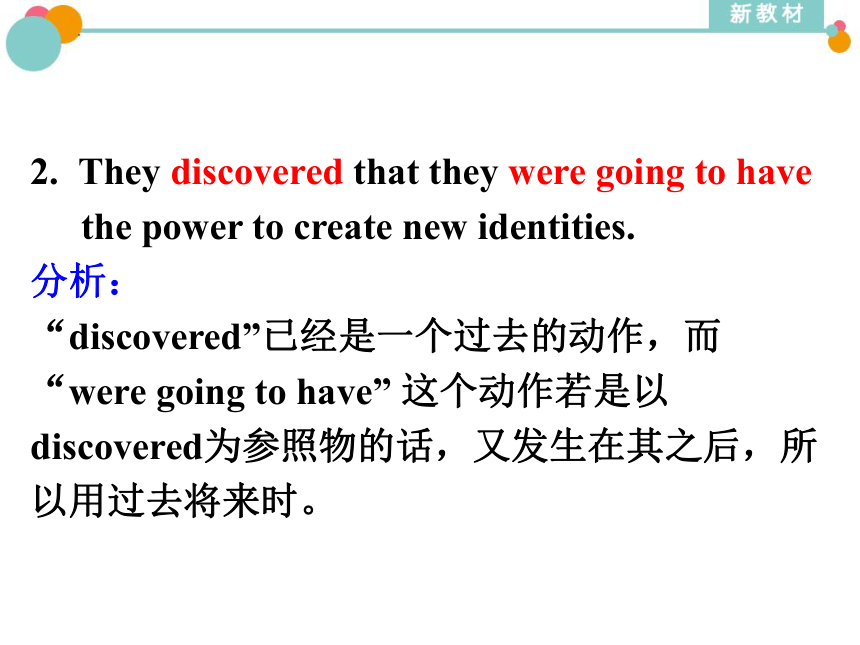


文档简介
(共33张PPT)
Unit 4
Information Technology
Lesson 1 AVATARS
Past Future
To learn to recognize a sentence with past future
To learn about and practice the past future
To learn to create your own avatar
For example:
People used to write letters, now people send emails and soon emails will be sent by voice command.
We use different forms of verbs to show past tense (used), present tense (send) or future tense (will be).
In English, it is verbs that have a tense to show if events happened in the past, present or future.
一般将来时(present future)的谓语结构如何表示?
Thinking
Will and be going to are used to talk about the present future.
一般将来时的谓语结构:
will + verb或 am/is/are going to + verb
过去将来时(past future)的谓语结构又该如何表示?
We turn will into would, be going to into was/were going to in the past future.
过去将来时的谓语结构:
would + verb或 was/were going to + verb
Thinking
Past Future 过去将来时
We use the past future to talk about what will happen in the future from the point of some time in the past.
过去将来时表示从过去某时看将来要发生的事情。
一般会有一个发生在过去的动作,而过去将来时的动作要以此过去动作为参照点,在这个动作之后,将要发生的动作即可用过去将来时。
1. Very few people knew that future avatars would have such a wide variety of forms and uses.
分析:
“knew”已经是一个过去的动作,而 “would have” 这个动作若是以knew为参照物的话,又发生在knew之后,所以用过去将来时。
2. They discovered that they were going to have the power to create new identities.
分析:
“discovered”已经是一个过去的动作,而 “were going to have” 这个动作若是以discovered为参照物的话,又发生在其之后,所以用过去将来时。
eg By the day of the show, more than 300 people had said they would attend. (2019江苏卷)
He said that if he quit the job, he would lose his drive(动力) to work and succeed.
(2018浙江卷)
过去将来时的句式结构
肯定句
主语+would / should+ 动词原形
主语+was/were going to +动词原形
否定句
主语+would / should not +动词原形
主语+was/were not going to +动词原形
疑问句
Would / Should +主语+动词原形
Was/Were+主语+ going to +动词原形
什么情况下用过去将来时(Past Future)
1. 从过去的某一时间来看将来(仍然是过去时间)要发生的动作或呈现的状态。
eg She was fifty-eight then. In two years, she would be sixty.
I was in a bad time, so I was going to have a trip the next day.
2. 表示过去某时将要发生的动作或存在的状态,常用于宾语从句中。
eg I asked the man opposite if he would open the door.
前面分析的两个例句中的过去将来时也是用在宾语从句中。
3. 虚拟条件句中
在if引导的虚拟条件句中,其主句动词往往要采用would do的用法。
eg If I were you, I would reconsider his
suggestion.
(Notes:虚拟句中不用was,只用were)
He would pass out if he took one more
drink.
4. would除了用于过去将来时中,还可以用来表示“过去重复的动作”。试判断:
He said he would raise the question at the meeting.
When I was small, my mum would read me stories at night.
Whenever we had trouble, he would come to help us.
past future
repeated action in the past
repeated action in the past
基本用法:
1. “would / should +动词原形”表示从过去观点看将要发生的事。第一人称后可用would。
eg My pen friend James said he would visit me in July.
I told my uncle that I would / should see him the next Sunday.
2. “was / were going to +动词原形”或“was / were to +动词原形”可表示过去打算、准备做的事(未必实现),也可以表示过去按计划或安排即将发生的事。
eg Last night I was going to take a bath, but the light suddenly went out.
Mr. Li said that all the students were to meet at the school gate the next morning.
3. “was / were about to +动词原形”表示过去某时正要、就要、即将做某事(该句型不与具体时间连用)。
eg I was about to go out when Jerry arrived.
【注意】
1. come, go, leave, arrive, start等动词可用过去进行时代替过去将来时。
eg My brother said the train was leaving at six the next morning.
2. 固定句型:
was / were (just) going to +动词原形+ when
was / were (just) about to +动词原形+ when
正要……这时(某件意外事情发生了)
eg We were (just) about to / going to arrive home when my car broke down.
Read the sentences. Write P below the underlined parts that refer to the past and PF below the underlined parts that refer to the future in the past.
1. Yet, very few people knew that future avatars would have such a wide variety of forms and uses.
P
PF
2. When people started creating their own avatars, they discovered that they were going to have the power to create new identities that did not look or act like real selves at all.
3. Many Internet users realised that their avatars would be seen by many people, not just their friends.
P
PF
P
P
PF
Complete the sentences talking about the future in the past.
In the 1990s, few people knew that…
When computers were invented, it was believed that…
In the past few years, users of smartphones realised that…
4. The convenience of the Internet made Internet users discover that…
5. When avatars first appeared in the 1980s, few people believed that…
智能手机
便利,方便
Create your own avatar. Introduce it to your partner.
What does it look like
Why did you decide to create it this way
Where would you use it
EXPRESS YOURSELF
What is Past Future What do we use it for
How to form a Past Future sentence (its structures)
When can we use a Past Future sentence
单项填空。
1. —The plane is leaving right now, but Kevin hasn’t arrived yet.
—Well, he said he _____ here on time.
A. was B. would be
C. can be D. will be
B
2. You won’t miss him. He _____ a dark green suit and a yellow tie waiting for you then.
A. will be wearing B. will wear
C. wears D. is wearing
3. Our TV sets sell well, but ten years ago no one could have imagined such a big share in the market that we ____.
A. were having B. had had
C. were to have D. had
A
C
4. —Let’s go shopping. It’s said that Jinying Shop _____, and all the sweaters are sold at half price.
—OK.
A. has closed down B. was closing down
C. closes down D. is closing down
5. My brother had planned to see me off at the airport, but he didn’t, because he _____ an important conference.
A. attended B. was going to attend
C. had attended D. is to attend
D
B
请根据汉语意思完成相应的英语句子,每空一词。
1. 我叔叔告诉我他下个月将要买一辆新车。
My uncle told me that he _______ _______ a new car the next month.
2. 李明说他下午将要去踢足球。
Li Ming said that he _______ _______ _______ _______ football in the afternoon.
would buy
was going to
play
单句语法填空。
1. Helen said she _____________ (tell) the news to her parents the next day.
2. I _____________________ (attend) the party last night, but an unexpected visitor came.
would tell
was going to attend
Use the vocabulary you’ve learnt in this unit and the past future tense to write a short paragraph describing your avatar.
Unit 4
Information Technology
Lesson 1 AVATARS
Past Future
To learn to recognize a sentence with past future
To learn about and practice the past future
To learn to create your own avatar
For example:
People used to write letters, now people send emails and soon emails will be sent by voice command.
We use different forms of verbs to show past tense (used), present tense (send) or future tense (will be).
In English, it is verbs that have a tense to show if events happened in the past, present or future.
一般将来时(present future)的谓语结构如何表示?
Thinking
Will and be going to are used to talk about the present future.
一般将来时的谓语结构:
will + verb或 am/is/are going to + verb
过去将来时(past future)的谓语结构又该如何表示?
We turn will into would, be going to into was/were going to in the past future.
过去将来时的谓语结构:
would + verb或 was/were going to + verb
Thinking
Past Future 过去将来时
We use the past future to talk about what will happen in the future from the point of some time in the past.
过去将来时表示从过去某时看将来要发生的事情。
一般会有一个发生在过去的动作,而过去将来时的动作要以此过去动作为参照点,在这个动作之后,将要发生的动作即可用过去将来时。
1. Very few people knew that future avatars would have such a wide variety of forms and uses.
分析:
“knew”已经是一个过去的动作,而 “would have” 这个动作若是以knew为参照物的话,又发生在knew之后,所以用过去将来时。
2. They discovered that they were going to have the power to create new identities.
分析:
“discovered”已经是一个过去的动作,而 “were going to have” 这个动作若是以discovered为参照物的话,又发生在其之后,所以用过去将来时。
eg By the day of the show, more than 300 people had said they would attend. (2019江苏卷)
He said that if he quit the job, he would lose his drive(动力) to work and succeed.
(2018浙江卷)
过去将来时的句式结构
肯定句
主语+would / should+ 动词原形
主语+was/were going to +动词原形
否定句
主语+would / should not +动词原形
主语+was/were not going to +动词原形
疑问句
Would / Should +主语+动词原形
Was/Were+主语+ going to +动词原形
什么情况下用过去将来时(Past Future)
1. 从过去的某一时间来看将来(仍然是过去时间)要发生的动作或呈现的状态。
eg She was fifty-eight then. In two years, she would be sixty.
I was in a bad time, so I was going to have a trip the next day.
2. 表示过去某时将要发生的动作或存在的状态,常用于宾语从句中。
eg I asked the man opposite if he would open the door.
前面分析的两个例句中的过去将来时也是用在宾语从句中。
3. 虚拟条件句中
在if引导的虚拟条件句中,其主句动词往往要采用would do的用法。
eg If I were you, I would reconsider his
suggestion.
(Notes:虚拟句中不用was,只用were)
He would pass out if he took one more
drink.
4. would除了用于过去将来时中,还可以用来表示“过去重复的动作”。试判断:
He said he would raise the question at the meeting.
When I was small, my mum would read me stories at night.
Whenever we had trouble, he would come to help us.
past future
repeated action in the past
repeated action in the past
基本用法:
1. “would / should +动词原形”表示从过去观点看将要发生的事。第一人称后可用would。
eg My pen friend James said he would visit me in July.
I told my uncle that I would / should see him the next Sunday.
2. “was / were going to +动词原形”或“was / were to +动词原形”可表示过去打算、准备做的事(未必实现),也可以表示过去按计划或安排即将发生的事。
eg Last night I was going to take a bath, but the light suddenly went out.
Mr. Li said that all the students were to meet at the school gate the next morning.
3. “was / were about to +动词原形”表示过去某时正要、就要、即将做某事(该句型不与具体时间连用)。
eg I was about to go out when Jerry arrived.
【注意】
1. come, go, leave, arrive, start等动词可用过去进行时代替过去将来时。
eg My brother said the train was leaving at six the next morning.
2. 固定句型:
was / were (just) going to +动词原形+ when
was / were (just) about to +动词原形+ when
正要……这时(某件意外事情发生了)
eg We were (just) about to / going to arrive home when my car broke down.
Read the sentences. Write P below the underlined parts that refer to the past and PF below the underlined parts that refer to the future in the past.
1. Yet, very few people knew that future avatars would have such a wide variety of forms and uses.
P
PF
2. When people started creating their own avatars, they discovered that they were going to have the power to create new identities that did not look or act like real selves at all.
3. Many Internet users realised that their avatars would be seen by many people, not just their friends.
P
PF
P
P
PF
Complete the sentences talking about the future in the past.
In the 1990s, few people knew that…
When computers were invented, it was believed that…
In the past few years, users of smartphones realised that…
4. The convenience of the Internet made Internet users discover that…
5. When avatars first appeared in the 1980s, few people believed that…
智能手机
便利,方便
Create your own avatar. Introduce it to your partner.
What does it look like
Why did you decide to create it this way
Where would you use it
EXPRESS YOURSELF
What is Past Future What do we use it for
How to form a Past Future sentence (its structures)
When can we use a Past Future sentence
单项填空。
1. —The plane is leaving right now, but Kevin hasn’t arrived yet.
—Well, he said he _____ here on time.
A. was B. would be
C. can be D. will be
B
2. You won’t miss him. He _____ a dark green suit and a yellow tie waiting for you then.
A. will be wearing B. will wear
C. wears D. is wearing
3. Our TV sets sell well, but ten years ago no one could have imagined such a big share in the market that we ____.
A. were having B. had had
C. were to have D. had
A
C
4. —Let’s go shopping. It’s said that Jinying Shop _____, and all the sweaters are sold at half price.
—OK.
A. has closed down B. was closing down
C. closes down D. is closing down
5. My brother had planned to see me off at the airport, but he didn’t, because he _____ an important conference.
A. attended B. was going to attend
C. had attended D. is to attend
D
B
请根据汉语意思完成相应的英语句子,每空一词。
1. 我叔叔告诉我他下个月将要买一辆新车。
My uncle told me that he _______ _______ a new car the next month.
2. 李明说他下午将要去踢足球。
Li Ming said that he _______ _______ _______ _______ football in the afternoon.
would buy
was going to
play
单句语法填空。
1. Helen said she _____________ (tell) the news to her parents the next day.
2. I _____________________ (attend) the party last night, but an unexpected visitor came.
would tell
was going to attend
Use the vocabulary you’ve learnt in this unit and the past future tense to write a short paragraph describing your avatar.
同课章节目录
- Unit 4 Information technology
- Lesson 1 Avatars
- Lesson 2 Apps
- Lesson 3 Internet and Friendships
- Unit 5 Humans and nature
- Lesson 1 A Sea Story
- Lesson 2 Professional Rescue Team
- Lesson 3 Race to the Pole
- Unit 6 The admirable
- Lesson 1 A Medical Pioneer
- Lesson 2 History Makers
- Lesson 3 The Superhero Behind Superman
